牛津译林版八年级英语下册全册词汇、句型、语法知识点及训练汇总
译林牛津八年级下册知识点梳理

牛津初中英语8B unit1—unit8 知识点归纳8B Unit1【考点精讲】一、核心词汇1.past n.[考点点拨]past作名词,意为“过去”,其还可作介词和形容词,可用于如下情况:in the past(n.)在过去;half past(prep.)five 5点半;in the past(adj.)three years在过去的3年里。
如:When he walks past our desks, he always knocks ourbooks and pens off the desks.当他走过我们课桌的时候,他总是把我们的书本和钢笔从课桌上碰掉下来。
The boy finished his homework with the help of his father in the past.这个男孩过去是在他父亲的帮助下完成作业的。
2.present n.[考点点拨]present作名词,意为“现在,目前”。
At present=at the moment=right now 目前;其还可作形容词,your present job你目前的工作;present用作名词,还可表示“礼物”,a birthday present -份生日礼物。
如:He is washing his clothes at present.现在他正在洗衣服。
3.northern adj。
[考点点拨] 方位词:north-northern; west-western; south-southern; east-eastern。
如:in the north of China = in the northern part of China在中国北部East China华东;North China华北The northern part of the city used to be sparsely populated, but has now become acultural centre.城北过去人口稀少,但现在成了文化中心。
(精品英语:牛津译林版八年级下册语法大全
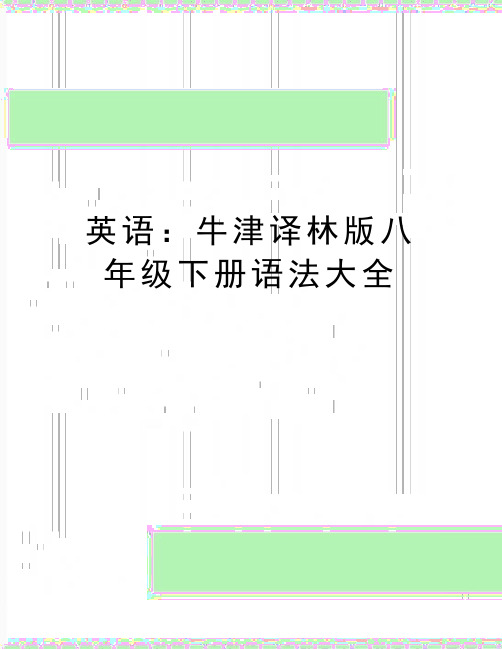
英语:牛津译林版八年级下册语法大全(UNIT1)现在完成时的重点和难点一、现在完成时的"完成用法"和"未完成用法"1.现在完成时的"完成用法"现在完成时的"完成用法"指的是动作发生在过去某一时刻并已结束,但该动作对现在产生了影响,与现在情况具有因果关系。
例如:He has turned off the light.他已把灯关了。
(动作结束于过去,但说明的是现在的情况--灯现在不亮了。
)现在完成时"完成用法"的特点是动作不延续,因此,该时态只能与表示不定的过去时间状语(如:already,yet,before,recently等)、频度时间状语(如:never,ever,once等)、包括现在时刻在内的时间状语(如:this morning / month /year...,today等)连用。
例如: Have you found your pen yet?你已找到你的钢笔了吗?2.现在完成时的"未完成用法"现在完成时的"未完成用法"指的是动作开始于过去某一时刻,一直延续到现在,或可能还要继续下去。
例如:He has lived here since 1978.自从1978年以来,他一直住在这儿。
(动作起始于1978年,一直住到现在,可能还要继续住下去。
)I have been in the army for more than 5 years.我在部队已经呆了五年多了。
(动作开始于5年前,一直延续至今,有可能还要继续下去。
)此种用法的句中常需一个表示一段时间的状语(由since或for引导),或表示与现在时刻相连的时间状语(如:up to now,so far到目前为止)等。
例如:I have heard nothing from him up to now.到目前为止我没有他的任何消息。
新牛津译林版八年级英语下册Unit1重点词组、句型及语法复习提纲
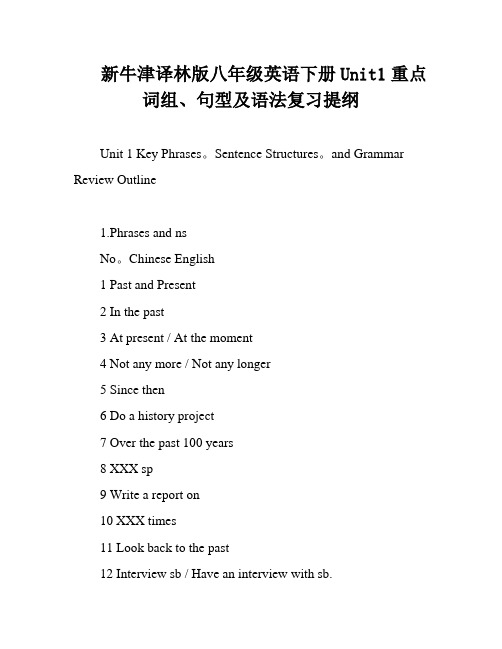
新牛津译林版八年级英语下册Unit1重点词组、句型及语法复习提纲Unit 1 Key Phrases。
Sentence Structures。
and Grammar Review Outline1.Phrases and nsNo。
Chinese English1 Past and Present2 In the past3 At present / At the moment4 Not any more / Not any longer5 Since then6 Do a history project7 Over the past 100 years8 XXX sp9 Write a report on10 XXX times11 Look back to the past12 Interview sb / Have an interview with sb.13 XXX14 Move to/into/out of/away15 In the southern part of China16 A marry B / A be/get married to B / A and B get married17 Have been to/have gone to/have been in sp.18 In fact19 Great changes20 XXX into a park / Change into a park21 Miss my old friends22 Play cards and Chinese chess23 Take off (clothes)24 XXX25 XXX.26 Used to do / Used to be27 Be used to doing28 Be used to do sth29 Dump into30 XXX31 XXX2.Sentence StructuresSimple present tense: Subject + VerbPresent continuous XXX: Subject + be + Verb + -ingSimple past XXX: Subject + Verb + -ed/2nd formPast continuous tense: Subject + was/were + Verb + -ingPresent perfect tense: Subject + have/has + Verb + -ed/3rd formPast perfect XXX: Subject + had + Verb + -ed/3rd formFuture XXX: Subject + will/shall + VerbPassive voice: Object + be + Verb + -ed/3rd form + (by + subject)XXX: Reporting verb + (that) + subject + Verb3.GrammarArticles (a/an/the)XXX)Adverbs (often/always/never/sometimes)Adjectives (big/small/great/happy)XXX)XXX)Modal verbs (can/could/may/might/must/will/would/should) XXX)XXX)Gerunds and infinitives (Verb + -ing/to + Verb)32.In some ways。
牛津译林英语八年级下册全册(Unit1-8)知识点汇总

牛津译林英语八年级下册全册知识点汇总8B Unit11.I've just eaten it.我刷才把它吃了。
just作副词“刚刚,刚才”,通常与现在完成时连用。
Mr Wang has just left our classroom. 王老师刚刚离开我们的教室。
I've just heard the news. 我刚听到这个消息。
①just副词“正好,恰好”,常与名词、名词性短语或句子连用,起加强语气的作用。
This jacket is just my size. 这件夫克衫正合我的尺码。
②just now“刚才,刚刚”=a moment ago,常用于句末。
I met one of my friends in the street just now.我刚才在衡上遇到了我的一个朋友。
③just then“就在那时”。
Just then,someone knocked at the front door. 就在那时,有人在前门敲门。
2.You've changed,Eddie.埃迪,你变了。
①change不及物动词“变化”,过去分词changedThe city has changed a lot since 2000. 这个城市自从2000年以来变化很大。
In England,the weather changes very often. 在英格兰,天气时常变化。
②change及物动词“交换;改变;换乘”。
Can I change seats with you? 我可以和你换一下座位吗?At last,he changed his mind. 最后,他改变了主意。
I stopped in Moscow only to change planes. 我为了转机才在莫斯科停留的。
③change可数名词“改变,变化,转变”;不可数名词“零钱”。
Great changes have taken place in this city since 1984.自从1984年以来,这个城市已发生了很大的变化。
牛津译林版八年级下册英语各单元语法知识点复习提纲(全面!)
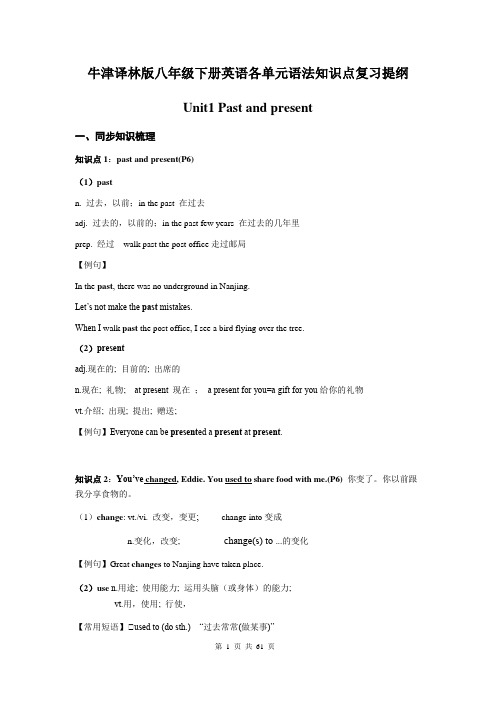
牛津译林版八年级下册英语各单元语法知识点复习提纲Unit1 Past and present一、同步知识梳理知识点1:past and present(P6)(1)pastn. 过去,以前;in the past 在过去adj. 过去的,以前的;in the past few years 在过去的几年里prep. 经过walk past the post office走过邮局【例句】In the past, there was no underground in Nanjing.Let’s not make the past mistakes.When I walk past the post office, I see a bird flying over the tree.(2)presentadj.现在的; 目前的; 出席的n.现在; 礼物; at present 现在;a present for you=a gift for you给你的礼物vt.介绍; 出现; 提出; 赠送;【例句】Everyone can be present ed a present at present.知识点2:You’ve changed, Eddie. You used to share food with me.(P6) 你变了。
你以前跟我分享食物的。
(1)change: vt./vi. 改变,变更; change into变成n.变化,改变; change(s) to ...的变化【例句】Great changes to Nanjing have taken place.(2)use n.用途; 使用能力; 运用头脑(或身体)的能力;vt.用,使用; 行使,【常用短语】①used to (do sth.) “过去常常(做某事)”批注:否定形式:didn’t use to / usedn’t to①get/be used to(doing sth. )“习惯于(做某事)【例句】He used to go fishing every Saturday. But since he changed his job, he’s barely(几乎不) had a chance. He thinks he’ll never be used to this busy lifestyle.【拓展】useful adj. 有用的;useless adj. 无用的知识点3:I first lived in the northern part of the town with my parents.(P8)【例句】Beijing is in the northern part of China.批注:注意in the north与in the northern part of 的同义句转换。
牛津译林版八年级英语下册各单元知识点归纳(Units1-8)
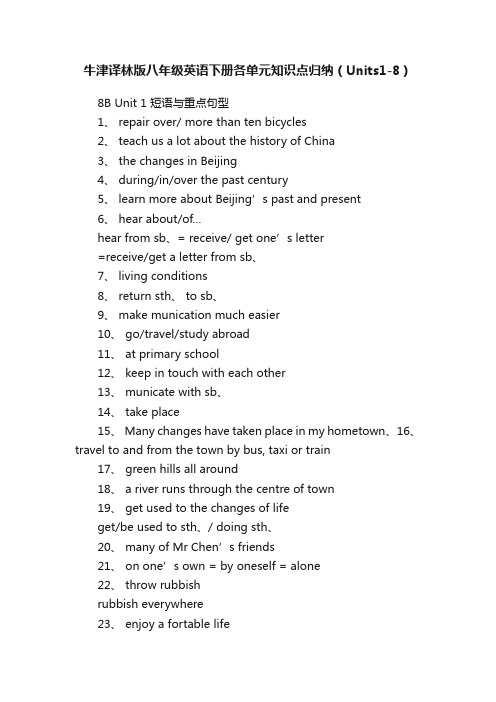
牛津译林版八年级英语下册各单元知识点归纳(Units1-8)8B Unit 1 短语与重点句型1、 repair over/ more than ten bicycles2、 teach us a lot about the history of China3、 the changes in Beijing4、 during/in/over the past century5、learn more about Beijing’s past and present6、hear about/of…hear from sb、= receive/ get one’s letter=receive/get a letter from sb、7、 living conditions8、 return sth、 to sb、9、 make munication much easier10、 go/travel/study abroad11、 at primary school12、 keep in touch with each other13、 municate with sb、14、 take place15、 Many changes have taken place in my hometown、16、travel to and from the town by bus, taxi or train17、 green hills all around18、 a river runs through the centre of town19、 get used to the changes of lifeget/be used to sth、/ doing sth、20、many of Mr Chen’s friends21、on one’s own = by oneself = alone22、 throw rubbishrubbish everywhere23、 enjoy a fortable life24、 in some large open spaces25、 move into new flats26、 in their free time27、 travel around the town28、 on both sides of the street = on each sideof the street29、 have their own cars= have cars of their own修理超过10辆自行车教我们很多有关中国得历史北京得变化在过去一个多世纪里对北京得过去与现在了解更多听说收到某人来信居住条件把某物归还给某人使交流更方便,使得联系更容易去国外在小学互相保持联系与某人保持联系发生(有目得有计划得)(happen偶然发生) 我得家发生了许多变化。
牛津译林版英语八年级下册 Unit 1 语法、词汇、句型知识点总结(详细版)

牛津译林版英语八年级下册Unit 1 语法、词汇、句型知识点总结(详细版)8B Unit 1 Past and presentComic strip & Welcome to the unit1.I've just eaten it.我刚才把它吃了。
just此处用作副词,意为“刚刚,刚才”,通常与现在完成时连用。
Mr Wang has just left our classroom.王老师刚刚离开我们的教室。
I've just heard the news.我刚听到这个消息。
拓展:①just 副词,还可意为“正好,恰好;仅仅,只是”,起加强语气的作用。
This jacket is just my size.这件夹克衫正合我的尺码。
That's just what he wanted.那正是他所要的。
He is just a child.他仅仅是一个孩子。
I just want to talk to you.我只是想和你谈谈。
①just now意为“刚才,刚刚”,相当于a moment ago,常用于句末,用于一般过去时态的句子中。
I met one of my friends in the street just now.我刚才在街上遇到了我的一个朋友。
①just then 意为“就在那时”。
Just then, someone knocked at the front door.就在那时,有人敲了敲前门。
2.Why?为什么?这是一个省略问句,其完整形式是“Why did you eat my food?”。
why引导的特殊疑问句用来询间原因,通常用because(因为)引导的句子来回答。
—Why didn't you come to the meeting yesterday?你昨天为什么没来参加会议?—Because I had a bad cold.因为我患了重感冒。
译林版初中英语八年级下册全册Units1--8单元重点短语、句型、语法整理
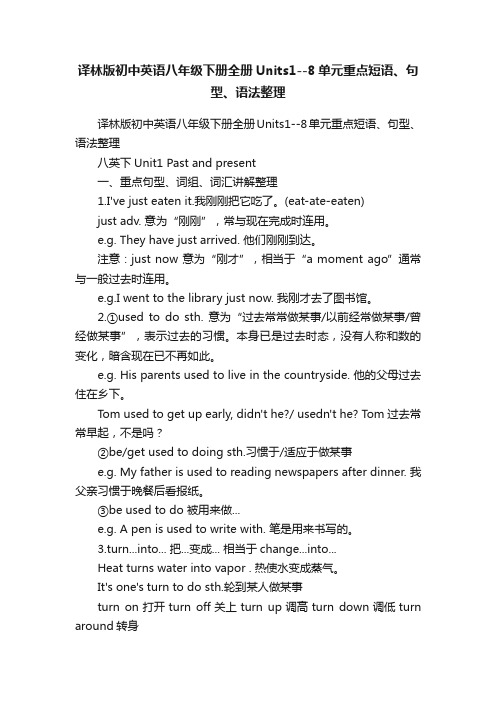
译林版初中英语八年级下册全册Units1--8单元重点短语、句型、语法整理译林版初中英语八年级下册全册Units1--8单元重点短语、句型、语法整理八英下Unit1 Past and present一、重点句型、词组、词汇讲解整理1.I've just eaten it.我刚刚把它吃了。
(eat-ate-eaten)just adv. 意为“刚刚”,常与现在完成时连用。
e.g. They have just arrived. 他们刚刚到达。
注意:just now 意为“刚才”,相当于“a moment ago”通常与一般过去时连用。
e.g.I went to the library just now. 我刚才去了图书馆。
2.①used to do sth. 意为“过去常常做某事/以前经常做某事/曾经做某事”,表示过去的习惯。
本身已是过去时态,没有人称和数的变化,暗含现在已不再如此。
e.g. His parents used to live in the countryside. 他的父母过去住在乡下。
Tom used to get up early, didn't he?/ usedn't he? Tom过去常常早起,不是吗?②be/get used to doing sth.习惯于/适应于做某事e.g. My father is used to reading newspapers after dinner. 我父亲习惯于晚餐后看报纸。
③be used to do 被用来做...e.g. A pen is used to write with. 笔是用来书写的。
3.turn...into... 把...变成... 相当于change...into...Heat turns water into vapor . 热使水变成蒸气。
It's one's turn to do sth.轮到某人做某事turn on打开turn off关上turn up调高turn down调低turn around转身by turns轮流地in turn依次turn in 上交4.in some ways 在某种程度上in this way以这种方式on the way (to )在...的路上by the way 顺便说下no way 没门in any way 无论如何5.It has become impossible for us to see each other as often as before.对我们来说,像以前一样相互见面已经变得不可能了。
- 1、下载文档前请自行甄别文档内容的完整性,平台不提供额外的编辑、内容补充、找答案等附加服务。
- 2、"仅部分预览"的文档,不可在线预览部分如存在完整性等问题,可反馈申请退款(可完整预览的文档不适用该条件!)。
- 3、如文档侵犯您的权益,请联系客服反馈,我们会尽快为您处理(人工客服工作时间:9:00-18:30)。
牛津译林版八年级英语下册Unit 1 Past and present词汇、句型、语法知识点及训练知识精讲一、必背词汇past n. 过去adj.过去的present n. 现在,目前just adv. 刚才since conj. 自……以来prep.自……以来ever adv. 曾经northern adj. 北方,北部的married adj. 已婚的,结婚的wife n.(pl. wives) 妻子block n.街区over prep. 在……期间pollution n. 污染;污染物factory n. 工厂waste n. 废料;废品realize (= realise )vt.& vi.意识到;实现improve vt.&vi. 改进,改善situation n. 形势,情况impossible adj. 不可能的before adv.以前,过去lonely adj. 孤独的,寂寞的anyway adv. 尽管,即使这样husband n. 丈夫interview n. 采访;会见yet adv. 还,仍recently adv.近来,最近environment n. 环境transport n.交通车辆,运输工具condition n. 环境,条件,状况return vi. 返回last adv.最近,上一次;最后abroad adv. 到(在)国外primary adj. 小学教育的;初级的communicate vt. &vi. 交流,交际exactly adv.(答语)正是,没错narrow adj. 狭窄的二、重点词汇1. present noun /ˈprez.ənt/1). something that you are given, without asking for it, on a special occasion, especially to showfriendship, or to say thank you(尤指表示友谊或致谢的)礼物,赠品例句:They gave me theatre tickets as a present.他们送给我戏票作为礼物。
2). the presentthe period of time that is happening now, not the past or the future现在,目前例句:That's all for the present. 暂且就讲这些。
3). at presentnow现在,目前例句:At present she's working abroad. 她目前在国外工作。
2. realize verb /ˈrɪə.laɪz/1). to understand a situation, sometimes suddenly明白;认识到;意识到例句:They didn't realize the danger they were in.他们没有意识到自己身处危险之中。
2). to achieve something you were hoping for实现;使变为事实;使发生例句:Ten years later her worst fears were realized.10年后,她最害怕的事情发生了。
3. lonely adjective /ˈləʊn.li/1). unhappy because you are not with other people孤独的,寂寞的例句:She gets lonely now that all the kids have left home.现在孩子们都离开了家,她感到有些孤独。
2). A lonely place is a long way from where people live.孤独的,孤零零的,远离人群的例句:a lonely stretch of Arizona highway 亚利桑那一段荒凉的公路4. recently adverb /ˈriː.sənt.li/not long ago, or at a time that started not long ago最近;近来例句:Have you seen any good films recently?你最近看过什么好电影吗?5. communicate verb /kəˈmjuː.nɪ.keɪt/1). to share information with others by speaking, writing, moving your body, or using other signals交流,沟通(信息)例句:We can now communicate instantly with people on the other side of the world.我们现在可以与生活在地球另一边的人们进行即时交流。
2). to talk about your thoughts and feelings, and help other people to understand them传达,表达,传递,沟通(思想或感情)例句:I find I just can't communicate with her. 我发现我和她就是无法沟通。
三、必背短语used to 曾经turn into 把……变成……in some ways 在某种程度上from time to time 不时,有时,偶尔all one's life 一生keep in touch 保持联系be used to 习惯于,适应于open space 开阔的空地get used to 习惯于,适应于四、经典句型1. You used to be so kind to me.你过去对我那么友好。
2. I've lived here since I was born.我自从出生以来就生活在这。
3. Has the town changed a lot over the years?这些年该镇变化很大吗?4. I have already read this book many times.这本书我已经读过很多遍了。
5. Many changes have taken place in Moonlight Town over the years.这些年月光城发生了很多变化。
三点剖析一、考点1. 现在完成时1). 构成形式:sb. have/has done2). 现在完成时用法:➢表示过去发生的或已经完成的某一动作对现在造成的影响或结果。
➢表示动作或状态在过去已经开始,持续到现在,也许还要持续下去,常和for, since连用。
3). 动词过去分词变化规律:➢一般情况下,直接在动词词尾加ed➢以“e”结尾的动词,在词尾加d➢以辅音字母+y结尾的动词,将y变成i 再加ed➢重读闭音节结尾,末尾只有一个辅音字母,双写辅音字母,再加ed➢其他不规则变化4). 相关句型➢一般疑问句:Have/Has +主语+done…?➢否定句:主语+have/has + not +done…2. since的用法1). since作介词时,意为“从……以来”。
since+ 时间点表示一段时间,常与完成时态连用,相当于for+一段时间。
例句:I have lived here since 5 years ago.=I have lived here for 5 years.自从五年前我就住在这儿。
2). since作连词时,还可引导时间状语从句。
通常主句用现在完成时,从句用一般过去时。
例句:Uncle Wang has worked at this factory since he came to this city.自从到这个城市以来,王叔叔一直在这个工厂工作。
二、易错点1. happen & take place1). happen表示“发生”,通常指未准备地发生或偶然发生。
例句:The accident happened at about 10.事故大约发生在10点钟。
2). take place通常指预先安排好要发生的事,因此在汉语中除翻译为“发生”外,还译为“举行”。
例句:The meeting will take place on Sunday.会议将于星期日举行。
Great changes have taken place here since last year.自去年以来,这里发生了巨大变化。
3). happen & take place都属于不及物动词,因此既不能带宾语,也不能用被动语态。
2. get used to和used to do1). get used to意为“习惯于……”,与be used to同义。
to为介词,后面跟代词、名词或动名词。
例句:His father gets used to getting up early.他父亲习惯于早起。
2). used to do sth表示“过去常常做某事”,to是不定式符号,后接动词原形。
used to本身就是过去时态,没有人与数的变化,暗含“现在已不再这样”之意。
be used to do sth表示“被用来做某事”,是use…to do sth的被动语态。
题模精选题模一:Unit 1 词汇应用例1.1.1 Last Thursday when I got to the station, I _________ I had left my ticket at home. A.understood B.realizedC.believed D.seemed例1.1.2 根据所给汉语意思完成句子,每空一词。
1). 我想坐公交车在市里四处转转。
I’d like to _________ _________ the city by bus.2). 这个地方曾经是个小村庄。
This place _________ _________ _________ a small village.题模二:语法--现在完成时例1.2.1 His brother has been to Stone Forest twice _________ he came to Yunnan.A.after B.before C.sinceD.for例1.2.2 根据要求改写句子。
1). Susan has been in this city for more than ten years. (改为同义句)_________ _________ more than ten years _________ Susan _________ to this city.2). His uncle has already posted the photos to him. (改为否定句)His uncle _________ posted the photos to him _________.随堂练习随练1.1 Mr. White is busy preparing for _________ interview these days. He says _________ interview will take place this Friday.A.an; the B.a; theC.an; an D.the; an随练1.2 Amy has studied in this school _________ she was seven years old.A.since B.if C.untilD.after随练1.3 Catherine got married _________ a policeman twenty years ago.A.with B.for C.toD.and随练1.4 根据所给汉语意思完成句子,每空一词。
